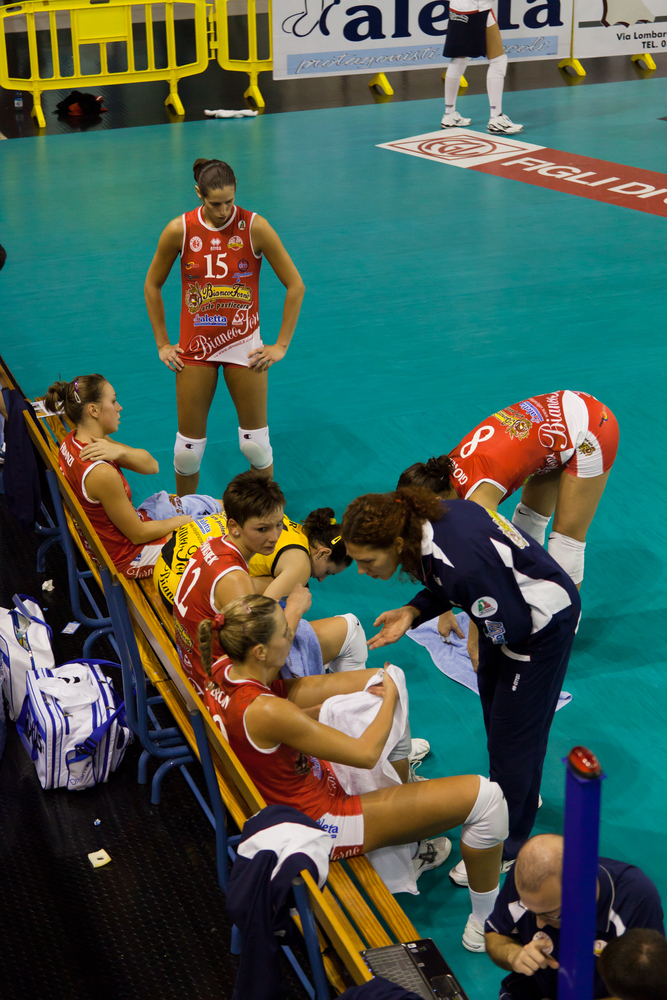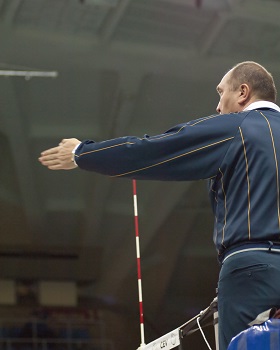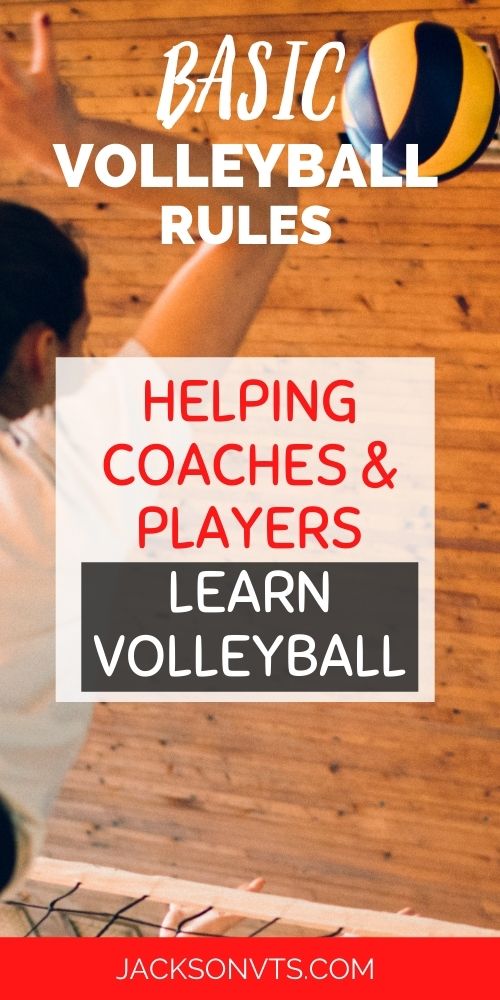Basic volleyball rules help new coaches and players learn volleyball. Understanding basic rules makes playing volleyball much easier.
Basics of the Game
A Volleyball Match
A volleyball match consists of 6 players on each team.
The serve
The serve begins when the server standing at the baseline hits the ball over the net to the opposing team.
Returning the serve
The opposing team returns the serve by using up to 3 contacts to return the ball over the net. During these 3 contacts, the same player can’t contact the ball in succession.
Teams may choose to use fewer than 3 contacts to return the ball, but at advanced levels of play, teams generally will use all 3 contacts.
Pass, set, hit
The strategy to score points involves pass, set, and hit.
The first team hit is usually a pass towards the net. You want to pass the ball (using your forearms or hands in an overhead motion) in a way that makes it easy for a teammate to set the ball. The second team hit is a set to a hitter. The setter wants to set the ball in a way that makes it easy for another teammate (the hitter) to attack the ball. The attacker then hits the ball in a way that makes it hard for the opponent to return the ball over the net.

Specialized Positions
At advanced levels, players have specialized positions.
The strategy consists of moving the players around the court to take advantage of specific skills each player has developed.
Each player focuses on developing specific skills. They then use these specific skills to help their team score points.
Back row and front row players
One exception to moving players around the court is there are front row players and back row players. The back row players can’t hit or block in front of the attack line.

Basic Volleyball Rules – Scoring Points
Every play ends when one team wins a point. A team doesn’t have to serve a ball to score a point.
If the ball hits any part of the court boundary line, the ball is considered in.
If the ball lands outside the court, hits an antenna, the referee stand, the wall, etc then it’s considered out of play.
A play also ends when the referee blows the whistle to make a call regarding a violation.
Rotating
If the team that didn’t win the serve scores the point, each player on that team rotates clockwise around the court after they win the point.
In this situation, the player that is now moved into right back position, is now the new server.
Now, if the serving team wins the point, the team doesn’t rotate. All the players remain in their same positions and the same server initiates the next serve.
Players are allowed to move to anywhere on the court they want after the server contacts the ball.
If you enjoyed these tips and would like to keep it close to you at any time, just save this pin to your Pinterest Volleyball Board.

Rotation Order
Understanding rotation is a big part of basic volleyball rules. Teams submit line ups each game.
The order of the line up is the rotation order that players must maintain throughout the game.
Basic Volleyball Rules Related Pages
Libero Tracker
Libero tracker for volleyball. Learn how to track the libero and why you need to know where the libero is on the court. When a volleyball player comes into the game,
Rule Differences NCAA/USAV/NFHS
Here are some of the biggest differences among the NCAA/USA VOLLEYBALL/NFHS organizations.
Volleyball Lineup
Understanding your volleyball lineup is an important part to being successful in volleyball. How you decide to line up your team will depend on various things. Factors on experience, skill level…
Official Volleyall Rules
Basic volleyball rules for organized volleyball. Different organizations with their own set of rules. The league or club you play likely playing by the rules of FIVB, USAV, NFHS, or…
Volleyball Officials
Volleyball officials and professionalism. tips will help keep you out of trouble with coaches and get your matches running…
High School Rules
High school volleyball rules update. Do you know the major rule changes for this season? The following page explains the new rules and rationale…
Rules for Volleyball
Basic volleyball rules and comparisons between major organizations. NCAA, USAV, and national federation use different volleyball rules. The following page discusses major differences…
Court Dimensions
Volleyball court dimensions for NCAA women, USAV, and National Federation. Not all rules are the same from organization to organization. Court specifications for net height and court length…
Rules of Volleyball
Rules of volleyball and important rules to understand certain game situations. Volleyball rules can sometimes be hard to understand. The following situations are …
Violations
Volleyball mistakes include prolonged ball contact, multiple contacts in one attempt to play the ball, player touching the net, team out of alignment, and wrong server…
Officials in Volleyball
Officials in volleyball are required to carry with referee equipment. Whistles, lanyards, ball gauge, ball pump, both yellow red cards, flipping coin, net chain. Navy blue pants…
Officiating
How to for officiating volleyball, referee conduct, and how to act as a volleyball referee. Professionalism is the conduct or qualities that characterize or mark a professional person…
Rules for Dummies
Volleyball rules for dummies. Basic rule interpretations and violations in volleyball. Basic explanation of team line ups, rotation order, and rules for serving.
Officials
Officials volleyball. The first referee is referred to as R1. The second referee is referred to as R2. Each referee has different responsibilities pre-match and…
Home › Volleyball Rules
